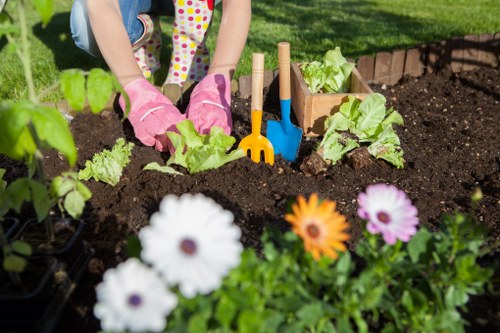Comprehensive Guide to Garden Maintenance in Acton

Maintaining a beautiful garden in Acton requires a blend of passion, knowledge, and consistent effort. Whether you're a seasoned gardener or a novice, understanding the nuances of garden maintenance can transform your outdoor space into a lush, thriving sanctuary. This guide delves into the essential aspects of garden upkeep, tailored specifically for the Acton climate and soil conditions.
Garden maintenance encompasses a variety of tasks, including pruning, weeding, fertilizing, and pest control. Each of these activities plays a pivotal role in ensuring your plants remain healthy and vibrant throughout the year. By adopting a systematic approach, you can enjoy a picturesque garden that enhances your home's aesthetic appeal and provides a serene environment for relaxation.
One of the first steps in effective garden maintenance is understanding the local climate. Acton experiences a temperate climate with distinct seasons, which influences the types of plants that thrive and the maintenance routines required. Selecting native or well-adapted plants can significantly reduce maintenance efforts and increase the resilience of your garden against local pests and diseases.

Essential Garden Maintenance Tasks
To maintain a flourishing garden in Acton, it's crucial to stay on top of several key maintenance tasks. These tasks not only promote plant health but also prevent potential issues that could compromise the beauty of your garden.
Pruning and Trimming
Regular pruning and trimming are vital for shaping plants, promoting growth, and preventing disease. Removing dead or diseased branches allows for better air circulation and sunlight penetration, which are essential for plant vitality. Additionally, pruning encourages the development of new growth, ensuring your garden remains lush and well-maintained.
When pruning, it’s important to use the right tools and techniques. Sharp, clean shears reduce the risk of damaging the plant, while proper cutting angles facilitate quicker healing. Understanding the specific needs of each plant species will help you determine the optimal pruning schedule and methods.
For ornamental shrubs and trees, consider the desired shape and size. Regular trimming helps maintain the aesthetic appeal and prevents overgrowth that could overshadow other plants. Seasonal pruning, typically done in late winter or early spring, aligns with the plants' growth cycles and maximizes the benefits of this maintenance activity.

Weeding and Soil Health
Weeds compete with your garden plants for essential nutrients, water, and sunlight. Effective weed control is a cornerstone of garden maintenance, ensuring that your desired plants can thrive without unnecessary competition.
Manual Weeding vs. Chemical Controls
Manual weeding, though labor-intensive, offers precise control over unwanted plants without introducing chemicals into your garden. This method is especially effective in smaller gardens or areas where chemical use is restricted. Regular weeding sessions prevent weeds from establishing deep root systems, making them easier to manage over time.
Chemical controls, such as herbicides, provide a more efficient solution for larger gardens or persistent weed issues. However, it's essential to use these products responsibly to avoid harming beneficial plants and soil organisms. Always follow the manufacturer's instructions and consider integrated pest management practices to minimize chemical reliance.
Maintaining healthy soil is equally important. Enriching the soil with organic matter, such as compost or well-rotted manure, improves its structure, fertility, and water-holding capacity. Healthy soil supports robust plant growth and creates an environment where desirable plants can outcompete weeds naturally.

Fertilizing and Nutrient Management
Proper fertilization is essential for supplying plants with the nutrients they need to grow and flourish. Balancing nutrient levels in the soil ensures that plants can perform vital functions like photosynthesis, root development, and flowering.
Types of Fertilizers
There are various types of fertilizers available, each serving a specific purpose. Organic fertilizers, such as bone meal, fish emulsion, and compost, release nutrients slowly and improve soil structure over time. Inorganic or synthetic fertilizers provide immediate nutrient availability and are often tailored to meet the specific needs of different plants.
When selecting a fertilizer, consider the nutrient requirements of your plants. Leafy vegetables, for example, may require higher nitrogen levels, while flowering plants benefit from fertilizers rich in phosphorus. Conducting a soil test can help determine existing nutrient levels and guide your fertilization strategy effectively.
Over-fertilization can be detrimental, leading to salt buildup, nutrient burn, and environmental pollution. It's crucial to follow recommended application rates and schedules to maintain optimal soil health and plant growth.

Pest and Disease Management
Pests and diseases can significantly impact the health and appearance of your garden. Proactive management strategies are essential to prevent infestations and minimize damage.
Identifying Common Garden Pests
Common pests in Acton gardens include aphids, slugs, snails, and caterpillars. These pests feed on plant tissues, stunt growth, and can transmit diseases. Regular monitoring allows for early detection and more effective control measures.
Natural Pest Control Methods
Encouraging natural predators, such as ladybugs, birds, and beneficial insects, helps keep pest populations in check. Additionally, using barriers like row covers and applying neem oil or insecticidal soaps can manage pests without harming the environment.
Disease Prevention and Treatment
Fungal diseases, such as powdery mildew and rust, thrive in humid conditions and can be mitigated through proper spacing, adequate air circulation, and resistant plant varieties. Removing and disposing of infected plant parts prevents the spread of diseases to healthy plants.
Implementing a regular pest and disease monitoring routine is crucial. Early intervention reduces the need for more aggressive and potentially harmful control measures, ensuring a healthy and vibrant garden.

Irrigation and Water Management
Efficient water management is a key component of garden maintenance in Acton. Proper irrigation practices ensure that plants receive the right amount of water, promoting healthy growth and conserving resources.
Choosing the Right Irrigation System
Selecting an appropriate irrigation system depends on the size of your garden, plant types, and water availability. Options include drip irrigation, which delivers water directly to the roots, and sprinkler systems, which provide broader coverage for lawns and larger plantings.
Installing a rainwater harvesting system can enhance water efficiency. Collecting and storing rainwater reduces reliance on municipal water supplies and provides a sustainable water source for your garden.
Watering Best Practices
Watering early in the morning or late in the evening minimizes evaporation and ensures that plants absorb water effectively. Deep, infrequent watering encourages deep root growth, making plants more resilient to drought conditions.
Using mulch around plants helps retain soil moisture, suppress weeds, and regulate soil temperature. Organic mulches, such as bark or straw, decompose over time, enriching the soil with nutrients.
Monitoring Soil Moisture
Regularly checking soil moisture levels allows you to adjust your watering schedule based on current weather conditions and plant needs. Tools like soil moisture meters can provide accurate readings, helping you avoid both under and over-watering.

Seasonal Garden Maintenance
Different seasons bring unique challenges and opportunities for garden maintenance in Acton. Adapting your maintenance routines to seasonal changes ensures year-round garden health and beauty.
Spring Maintenance
Spring is a critical time for preparing your garden for the growing season. Tasks include soil testing, amending with compost, pruning deciduous trees, and planting new annuals and perennials. Early spring clean-up removes debris and prepares plants for robust growth.
Summer Care
During the summer months, focus on regular watering, mulching, and pest control. Heat and dry conditions can stress plants, making consistent care essential. Pruning to improve air circulation helps prevent fungal diseases and keeps plants healthy.
Autumn Preparation
Autumn is the time to prepare your garden for the winter ahead. Tasks include raking fallen leaves, planting spring bulbs, and protecting sensitive plants from frost. Mulching in autumn helps insulate plant roots and maintain soil moisture levels during colder months.
Winter Maintenance
Winter maintenance involves protecting plants from extreme weather, pruning dormant trees and shrubs, and planning for the next growing season. Covering vulnerable plants with frost blankets or burlap can prevent damage from freezing temperatures.
Year-Round Tips
Regardless of the season, maintaining a garden journal can help track plant progress, note pest and disease occurrences, and plan future plantings. Keeping records ensures that you can make informed decisions and continuously improve your garden maintenance practices.

Choosing the Right Plants for Acton Gardens
Selecting plants that are well-suited to Acton's climate and soil conditions is fundamental to successful garden maintenance. The right plant choices reduce maintenance efforts and enhance the overall health and appearance of your garden.
Native Plants
Native plants are adapted to the local environment, making them more resilient and easier to maintain. They require less water, fewer fertilizers, and are naturally resistant to local pests and diseases. Incorporating native species into your garden supports local biodiversity and creates a harmonious ecosystem.
Perennials vs. Annuals
Perennials return year after year, providing consistent structure and color to your garden. They often require less maintenance once established, making them a cost-effective choice. Annuals, on the other hand, offer vibrant, seasonal blooms but need to be replanted each year, which can increase maintenance efforts.
Flowering Plants
Flowering plants add beauty and attract pollinators like bees and butterflies. Choose a variety of bloom times to ensure continuous color throughout the growing season. Consider plant heights, colors, and textures to create visual interest and depth in your garden design.
Below are some recommended plants for Acton gardens:
- Roses: Classic and versatile, roses offer a range of colors and fragrances.
- Lavender: Known for its soothing scent and purple hues, lavender attracts beneficial insects.
- Hostas: Ideal for shady areas, hostas provide lush foliage and subtle flowers.
- Daylilies: Hardy and low-maintenance, daylilies produce vibrant blooms with minimal care.
- Japanese Maple: Adds structural interest with its unique leaf shapes and colors.

Tools and Equipment for Effective Garden Maintenance
Having the right tools and equipment is essential for efficient garden maintenance. Investing in quality tools not only makes tasks easier but also ensures that you can maintain your garden effectively over time.
Basic Garden Tools
- Pruning Shears: Essential for trimming and shaping plants.
- Spade: Useful for digging, planting, and soil amendment.
- Garden Fork: Ideal for turning soil and removing weeds.
- Watering Can or Hose: Necessary for providing adequate moisture to plants.
- Gloves: Protect your hands from thorns, dirt, and pests.
Advanced Equipment
For larger gardens, advanced equipment can enhance efficiency:
- Lawn Mower: Keeps your lawn neat and promotes healthy grass growth.
- Leaf Blower: Quickly clears leaves and debris from hard surfaces.
- String Trimmer: Maintains edges and hard-to-reach areas.
- Compost Tumbler: Facilitates the decomposition of organic matter into nutrient-rich compost.
Maintenance of Tools
Proper maintenance of your garden tools extends their lifespan and ensures optimal performance. Clean tools after each use, sharpen blades regularly, and store them in a dry, protected area to prevent rust and deterioration.

Hiring Professional Garden Maintenance Services in Acton
While DIY garden maintenance can be fulfilling, hiring professional services can save time and ensure high-quality results. Professional gardeners bring expertise, specialized tools, and a systematic approach to garden care.
Benefits of Professional Services
- Expertise: Professionals have extensive knowledge of plant care, pest management, and landscape design.
- Time-Saving: Outsourcing maintenance tasks allows you to enjoy your garden without the time commitment.
- Customized Care: Services can be tailored to meet the specific needs of your garden and preferences.
- Consistent Results: Regular maintenance ensures your garden remains healthy and aesthetically pleasing year-round.
Choosing the Right Service Provider
When selecting a garden maintenance service in Acton, consider the following factors:
- Experience: Look for companies with a proven track record and positive client feedback.
- Services Offered: Ensure the provider offers the specific services you need, such as pruning, fertilizing, or pest control.
- Pricing: Compare pricing structures to find a service that fits your budget without compromising quality.
- Licensing and Insurance: Verify that the company is properly licensed and insured to protect against potential liabilities.
- Communication: Choose a provider that communicates clearly and understands your garden goals.
Investing in professional garden maintenance can enhance the beauty and functionality of your outdoor space, allowing you to fully enjoy your garden without the stress of upkeep.
Contact Us Today for Expert Garden Maintenance Services!
Ready to transform your Acton garden into a stunning oasis? Contact us today to schedule a consultation and discover how our professional garden maintenance services can meet your needs. Let us help you achieve the garden of your dreams!

Sustainable Garden Practices
Embracing sustainable practices in garden maintenance not only benefits the environment but also promotes long-term plant health and soil fertility. Sustainable gardening reduces waste, conserves resources, and creates a balanced ecosystem.
Composting
Composting is an eco-friendly way to recycle organic waste, such as kitchen scraps and garden trimmings, into nutrient-rich soil amendment. Adding compost to your garden improves soil structure, enhances moisture retention, and provides essential nutrients for plant growth.
Mulching
Mulching conserves soil moisture, suppresses weeds, and regulates soil temperature. Organic mulches, like straw, bark, or leaves, break down over time, enriching the soil and supporting beneficial microorganisms.
Rainwater Harvesting
Harvesting rainwater for garden use reduces dependency on municipal water systems and ensures a sustainable water supply. Installing rain barrels or cisterns captures runoff from roofs, providing a valuable resource during dry periods.
Incorporating these sustainable practices into your garden maintenance routine contributes to a healthier environment and a more resilient garden.

Gardening Tips for Beginners in Acton
Starting a garden in Acton can be a rewarding experience, and with the right guidance, even beginners can cultivate a thriving outdoor space. Here are some essential tips to help you get started.
Start Small
Begin with a manageable garden size to avoid feeling overwhelmed. A small garden allows you to focus on learning various gardening techniques and understanding the specific needs of your plants.
Choose the Right Plants
Select plants that are well-suited to Acton's climate and soil conditions. Native plants or those adapted to similar environments are generally easier to care for and more resilient against local pests and diseases.
Learn About Soil Preparation
Healthy soil is the foundation of a successful garden. Conduct a soil test to determine its pH and nutrient levels. Amend the soil with compost or other organic matter to improve its structure and fertility based on the test results.
Regularly monitoring and maintaining soil health ensures that your plants have the necessary conditions to grow strong and vibrant.

Enhancing Garden Aesthetics
Aesthetics play a significant role in garden maintenance, as a visually appealing garden enhances the overall ambiance of your outdoor space. Incorporating design principles and creative elements can elevate the beauty of your garden.
Landscape Design Principles
Understanding basic landscape design principles, such as balance, contrast, and harmony, helps create a cohesive and attractive garden layout. Arrange plants of varying heights, colors, and textures to add depth and interest to your garden beds.
Incorporating Hardscapes
Hardscapes, including pathways, patios, and garden structures, provide structure and functionality to your garden. Materials like stone, gravel, or wood complement plantings and create designated areas for relaxation and entertainment.
Adding Decorative Elements
Decorative elements, such as garden ornaments, lighting, and water features, enhance the visual appeal and create focal points within your garden. These elements add personality and can transform your garden into a captivating outdoor retreat.
Thoughtful design and creative enhancements make garden maintenance a more enjoyable and fulfilling endeavor.

Common Garden Maintenance Mistakes to Avoid
Even with the best intentions, certain mistakes can hinder your garden’s growth and health. Being aware of common pitfalls allows you to take preventive measures and maintain a thriving garden.
Overwatering
Overwatering is a frequent mistake that can lead to root rot, fungal diseases, and weakened plants. It's essential to understand the specific watering needs of each plant and adjust your irrigation practices accordingly.
Poor Soil Management
Neglecting soil health can stunt plant growth and reduce yields. Regularly amend your soil with organic matter, monitor pH levels, and address nutrient deficiencies to maintain a fertile growing environment.
Ignoring Pest Issues
Failing to address pest problems promptly can result in significant plant damage and the spread of diseases. Implementing a proactive pest management strategy ensures that minor issues do not escalate into major infestations.
By avoiding these common mistakes, you can ensure a healthy and vibrant garden that flourishes with minimal setbacks.

Advanced Gardening Techniques
For those looking to enhance their gardening skills, advanced techniques can improve plant health, productivity, and overall garden management. These methods require a deeper understanding of horticulture but can yield impressive results.
Pruning Techniques
Mastering various pruning techniques, such as thinning, heading, and deadheading, allows you to shape plants effectively and promote healthy growth. Each technique serves a specific purpose and is suited to different plant types and growth habits.
Companion Planting
Companion planting involves grouping compatible plants together to enhance growth, deter pests, and improve yields. Understanding plant relationships helps create a balanced and productive garden ecosystem.
Hydroponics and Vertical Gardening
Exploring hydroponics, which involves growing plants in a nutrient-rich water solution, can maximize space and increase efficiency. Vertical gardening utilizes vertical space to cultivate plants, making it ideal for small gardens or urban settings.
Incorporating these advanced techniques can significantly elevate your gardening prowess and the overall success of your Acton garden.

Conclusion
Effective garden maintenance in Acton combines knowledge, skill, and dedication to create a beautiful and thriving outdoor space. By understanding the local climate, selecting suitable plants, and adhering to consistent maintenance practices, you can enjoy a garden that enhances your home's beauty and provides a peaceful retreat.
Whether you choose to maintain your garden yourself or hire professional services, the key to success lies in proactive care and continuous learning. Embrace sustainable practices, stay informed about the latest gardening trends, and adapt your strategies to meet the evolving needs of your garden.
Ready to elevate your garden maintenance routine? Book your service now and let our experts help you achieve the garden of your dreams in Acton!